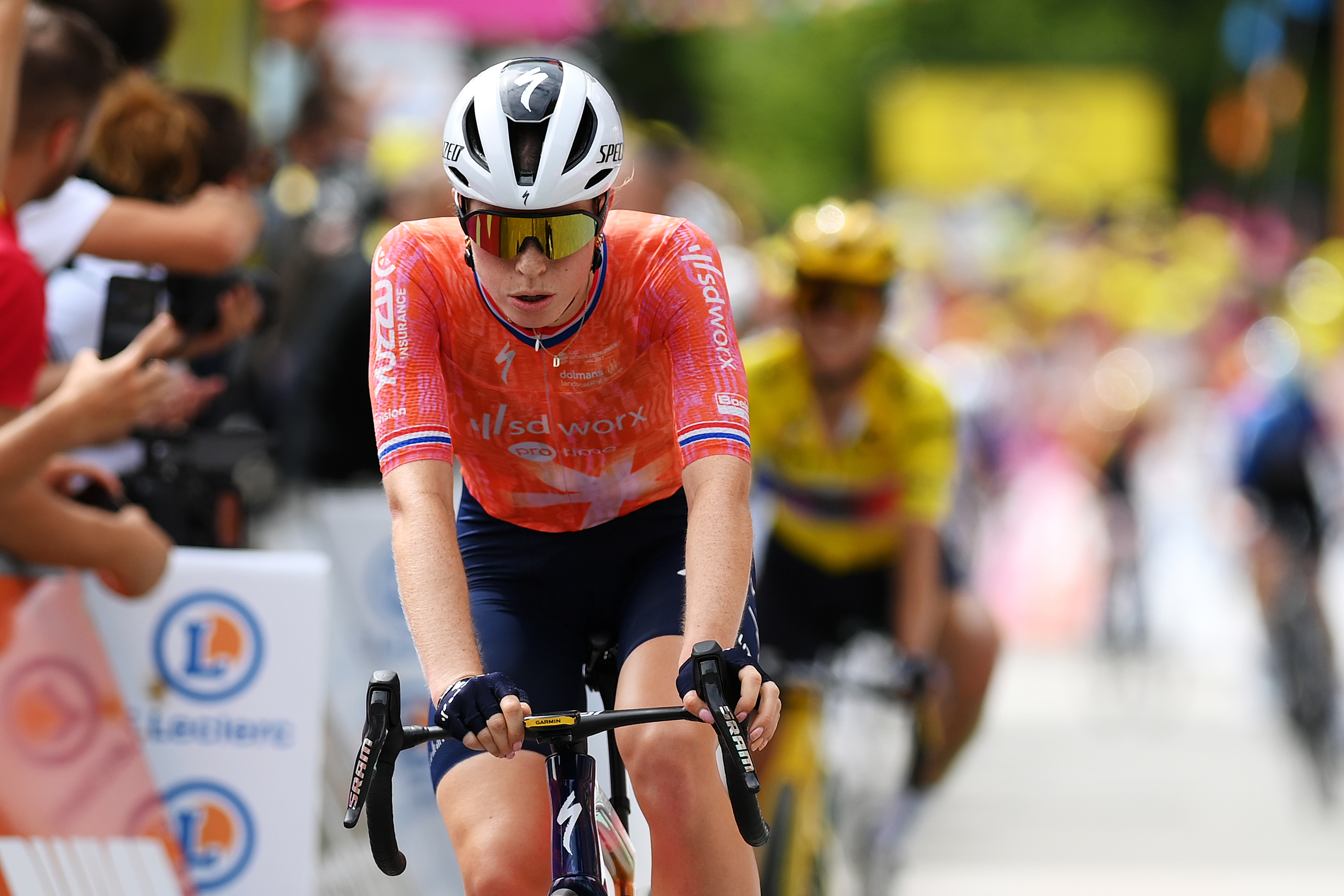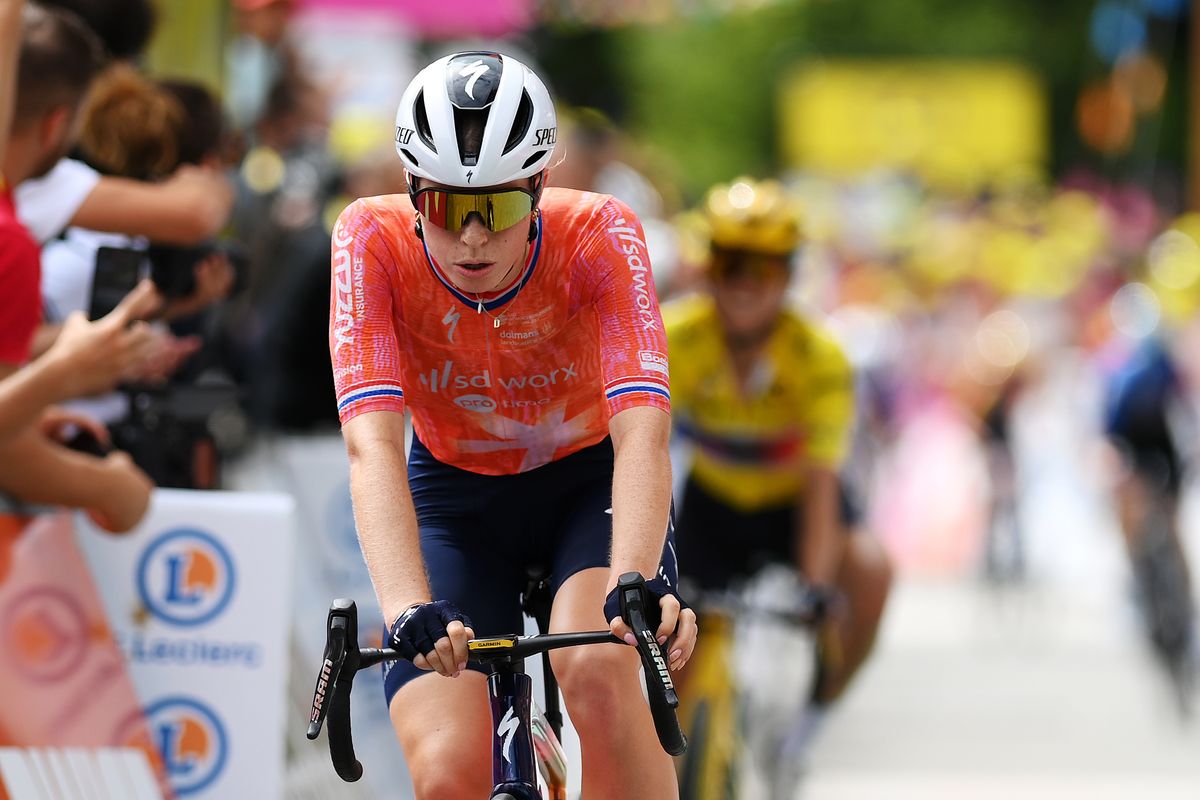
Demi Vollering has opened up about her battle with nervousness and strain finally yr’s Tour de France Femmes, revealing that she “hit a breaking level” on the penultimate stage.
In an effort to problem the stigma round psychological well being, Vollering wrote about her emotional anguish in an trustworthy and susceptible Instagram publish, detailing what she described as one of many hardest days of her profession on the stage to Le Grand-Bornand.
Vollering misplaced the yellow jersey and over a minute to Kasia Niewiadoma two days prior because of a crash which left her with a damaged tailbone and questionable techniques from her staff when she was left with little help to shut the hole.
All eyes have been on her to start out mounting a comeback on the primary of two mountain levels, with Alpe d’Huez nonetheless to comply with on the ultimate day. Nonetheless, for the Dutch rider who completed third that day, on reflection, simply ending stage 7 was a triumph.
“This was one of many hardest days of my profession. Bodily, I used to be nonetheless recovering from a crash 2 days earlier, Mentally, I used to be weighed down by strain – from the media, my staff, my family members, and from myself,” wrote Vollering.
“Everybody stored asking how I used to be feeling, and whereas I attempted to remain constructive, inside I used to be scared and unsure.
“Trying again, I understand this was one in all my greatest wins – not simply because I completed third, however as a result of I overcame one of many hardest moments I’ve confronted. For me, this might need been my most significant private victory in your complete Tour de France Femmes.”
The most recent race content material, interviews, options, evaluations and professional shopping for guides, direct to your inbox!
Vollering went on to attempt to put phrases to the sentiments of hysteria she endured that day and the way arduous it was to articulate what was incorrect when she sought assist from her teammate Mischa Bredewold.
“In the course of the race, I hit a breaking level. It’s arduous to explain what it felt like, however nervousness took over, and my ideas spiraled,” mentioned Vollering. “I could not focus. I felt like I used to be letting everybody down. For the primary time, I couldn’t simply energy by way of it alone.
“That is after I opened as much as my teammate. Though I couldn’t absolutely clarify what I used to be feeling, simply saying ‘I am not okay’ helped ease the burden I used to be carrying. Mischa didn’t attempt to repair it or brush it off; she merely stayed with me, reminding me that it’s okay to really feel overwhelmed and that I wasn’t alone.
“That day, I noticed how vital it’s to speak about what we’re going by way of. Anxiousness could make you’re feeling caught and remoted, however sharing your emotions – even when it’s arduous – may be step one towards aid.”
Breaking down the stigma round psychological well being
Whereas conversations round psychological well being in skilled sport have turn out to be extra frequent, perception from the lads’s or ladies’s peloton in biking stays sparse.
Vollering, nevertheless, has by no means shied away from sharing her feelings, in success or hardship, additionally occurring to acknowledge the battle feminine athletes bear when balancing the strain of elite competitors and their hormonal cycle in her publish.
“I additionally need to share one thing private that many ladies may relate to: later that day, I received my interval,” she mentioned.
“Hormones can amplify feelings, and with the strain I used to be already feeling, it was lots to deal with. It’s a reminder that our our bodies and minds are deeply linked, and typically, issues are simply past our management.”
The Dutch rider, conscious of her place as a number one determine in sports activities, a task mannequin and somebody who experiences excessive strain repeatedly, is hoping to encourage extra individuals to open up and never endure in silence.
“I’m sharing this as a result of I do know many, particularly younger individuals, carry the burden of expectations and strain. It’s not simple to speak about this stuff, however the extra we do, the extra we will break down the stigma round psychological well being,” she continued.
“We’re all human. All of us face battles. And regardless of how large or small they appear, they matter. You matter!
Vollering laid out three statements of steerage after revealing her personal experiences with nervousness and strain: “If you happen to can, discuss to somebody you belief. Even a small dialog could make a distinction.
“Be type to your self. It’s okay to really feel overwhelmed, and also you don’t have to have all of it discovered.
“Bear in mind, it’s not about fixing the whole lot without delay—it’s about taking small steps ahead, at your individual tempo.”
After the strain reached its breaking level, Vollering endured heartbreak on the ultimate day up Alpe d’Huez. Regardless of bouncing again to take the stage win, which is much more exceptional now given her newest revelations, Niewiadoma held onto yellow by 4 seconds – the narrowest margin in Tour de France historical past, males’s or ladies’s.
She’ll be again in 2025 to attempt to win again the title she claimed two years in the past on a brand new staff, FDJ-Suez, after shifting away from SD Worx-Protime. All eyes and the identical strain will probably be again on her because the probably favorite in opposition to former teammate Lotte Kopecky, who can have the assistance of the returning Anna van der Breggen, Vollering’s former coach.


